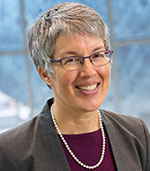Series to Highlight Women in Signal Processing: Sheila S. Hemami

 Sheila S. Hemami received the B.S.E.E. degree from the University of Michigan, Ann Arbor, MI, USA, in 1990 and the M.S.E.E. and Ph.D. degrees from Stanford University, Stanford, CA, USA, in 1992 and 1994, respectively and all in electrical engineering. She is presently Director of Strategic Technical Opportunities at Draper in Cambridge, MA, and joined Draper to launch its Global Challenges initiative in 2016 - applying Draper's capabilities and expertise to challenges for humankind and the planet. She has built Draper's Global Challenges program through the strategic selection of projects, partners, and funders to design solution-oriented programs for impact, deployability, and sustainability. Current projects in her environment and conservation-oriented portfolio span a broad range of cross-sector partners and include coral conservation, microplastic measurement, and counting hippos from space. Sheila's experience in developing interdisciplinary teams for impact was gained in her roles as a professor of electrical and computer engineering and academic leader at Cornell University in Ithaca, New York (where she spent 19 years), and at Northeastern University in Boston. She was with Hewlett Packard Laboratories in Palo Alto, California before joining Cornell. In addition to receiving both university and national teaching awards while at Cornell, Sheila led institution-wide diversity program development at Cornell through an NSF ADVANCE grant in 2006-13 that culminated in a 26% increase in women faculty in STEM/SBS and measurable increases in perceived empowerment and integration for women faculty. She has held various leadership positions in the IEEE, most recently Vice President of Publication Services and Products in 2015 and 2016. She was elected a Fellow of the IEEE in 2009 for contributions to robust and perceptual image and video communications and has graduated 45 MS and Ph.D. students, of whom she is very proud.
Sheila S. Hemami received the B.S.E.E. degree from the University of Michigan, Ann Arbor, MI, USA, in 1990 and the M.S.E.E. and Ph.D. degrees from Stanford University, Stanford, CA, USA, in 1992 and 1994, respectively and all in electrical engineering. She is presently Director of Strategic Technical Opportunities at Draper in Cambridge, MA, and joined Draper to launch its Global Challenges initiative in 2016 - applying Draper's capabilities and expertise to challenges for humankind and the planet. She has built Draper's Global Challenges program through the strategic selection of projects, partners, and funders to design solution-oriented programs for impact, deployability, and sustainability. Current projects in her environment and conservation-oriented portfolio span a broad range of cross-sector partners and include coral conservation, microplastic measurement, and counting hippos from space. Sheila's experience in developing interdisciplinary teams for impact was gained in her roles as a professor of electrical and computer engineering and academic leader at Cornell University in Ithaca, New York (where she spent 19 years), and at Northeastern University in Boston. She was with Hewlett Packard Laboratories in Palo Alto, California before joining Cornell. In addition to receiving both university and national teaching awards while at Cornell, Sheila led institution-wide diversity program development at Cornell through an NSF ADVANCE grant in 2006-13 that culminated in a 26% increase in women faculty in STEM/SBS and measurable increases in perceived empowerment and integration for women faculty. She has held various leadership positions in the IEEE, most recently Vice President of Publication Services and Products in 2015 and 2016. She was elected a Fellow of the IEEE in 2009 for contributions to robust and perceptual image and video communications and has graduated 45 MS and Ph.D. students, of whom she is very proud.
We approached her with a few questions:
Q. "Please tell us about your current position."
My title is Director of Strategic Technical Opportunities at Draper, in Cambridge, Massachusetts. Draper is a bit of a strange beast - we are a not-for-profit, highly advanced engineering company. Being not-for-profit affords a higher risk tolerance than many other organizations will take. I leverage our risk tolerance to make a difference in the world. I joined Draper to build our Global Challenges Initiative - applying our capabilities and expertise to challenges for humankind and the planet. My approach is to focus on problems that we are uniquely suited to solve, and for which we can identify partners who are intimately engaged in the problem space, to ensure that we are jointly posing the right questions and that the solutions are both deployable and sustainable. I believe strongly that communities must own solutions, and our efforts are collaborative across entire communities around a problem space.
Translation: I have a dream job for an engineer. Every day, I have the opportunity to step back, look at the myriad of seemingly impossible challenges facing the world today, and ask: on what problem can we move the needle, who do we need to partner with, and how do we move forward to make an impact? And then I reach out to other organizations and we start moving forward together. The feedback from them is quite positive, which is a wonderful bonus in this job. I find it very uplifting to regularly interact with so many people and entities around the world who clearly understand how the right technology solution can help them to be more effective and efficient at what they do, which is making a difference in the world.
Q. "You were an academic for over 2 decades. What made you decide to change sectors?"
I thrive on building programs from scratch and then institutionalizing them - creating the strategy, executing, and putting the processes and structures in place so that the programs outlast a single person (i.e., me) or office. Developing such programs allows me to be creative while also taking the long view and building the strong foundation needed for sustainability. I was presented with a tremendous opportunity at Draper to build an entirely new effort in an entirely new area, with the strength of such an iconic engineering organization behind me. I also was extremely impressed with Draper's leadership - having shared values and ethics with leadership about both personal and corporate behavior is important to me. I loved being a professor. I believe that the most important product of academia is the student - the next generation of engineers. We accomplish our research by training our products. I am extraordinarily proud of my graduate students - but graduate students leave as soon as they become maximally productive! So now I am enjoying myself in being able to accomplish very sophisticated engineering work with the product being a real solution with impact.
Q. "How does your work affect society?"
The very characteristics of the problems that meet my criteria for engagement mean that they are problems whose solutions are important for all of us, collectively. The environment is my largest portfolio, because Draper's skill sets are extraordinarily well suited to monitoring, measuring, and assessing - all extremely important to understand both the current state of the environment, as well as the effectiveness of any interventions or mitigations.
Q. "What challenges you had to face to get where you are today?"
Having grown up in the first-world, I think all of my challenges have been first-world challenges. They existed and will continue to exist, but they are quite small and petty compared with what others have had to go through. My takeaways from the integral of my challenges to date are (1) you can't change the past so don't dwell on it; rather, leverage it to direct your future; (2) put on your oxygen mask before helping others; and (3) an African proverb - if you want to go fast, go alone; if you want to go far, go together.
Q. "What advice would you give to scientists/engineers in signal processing?"
Execute your work to high quality and high ethical standards, treat your students and colleagues with respect, smile and be polite because you will always come out looking better than the jerk who asked you the snarky question, and don't send any emails that you wouldn't want to see printed in The New York Times. Everything else will follow. And you can't put too much effort into developing your communication skills! You can do the best work in the world, but if you can't explain it to anyone, it may as well not exist.

